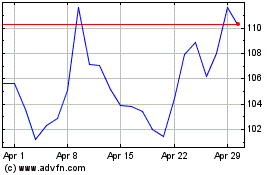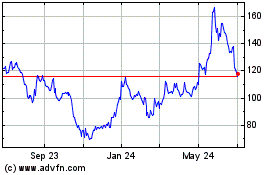Next Stop for Covid-19 Vaccines: FDA Review
November 19 2020 - 9:01AM
Dow Jones News
By Thomas M. Burton and Joseph Walker
The Food and Drug Administration is days away from beginning its
evaluation of Covid-19 vaccines for emergency use -- a process that
could lead to vaccine distributions by year's end to limited groups
such as health-care workers and the elderly.
Pfizer Inc. and German partner BioNTech SE plan to submit their
vaccine testing data to the FDA within days, followed closely by
Moderna Inc. That will set off a process in which FDA scientists
will begin to assess the accuracy of company data, which is likely
to take two to three weeks.
As part of that review, FDA scientists are expected to look at
data from individual patients, such as for indications of any
troubling side effects.
After the FDA staff review, an independent panel of doctors from
major U.S. academic centers will meet to advise the FDA on the
vaccines' efficacy -- likely in early December.
The advisory panel will consider questions such as whether the
vaccine has been shown safe and effective in certain racial, ethnic
and age groups. The panel will likely be asked to recommend whether
the vaccine should be authorized for use and in which
populations.
Pfizer, which said Wednesday it is on the verge of seeking FDA
review, has reported that its vaccine is more than 94% effective in
adults over 65. It said that about 42% of its trial participants
represent racial or ethnic minority groups.
After the review, the FDA then will decide whether to grant an
"emergency use authorization," a quicker version of the normal FDA
approval.
At the center of the process is Dr. Peter Marks, 57 years old,
who oversees vaccines as the director of the FDA's Center for
Biologics Evaluation and Research. Trained at New York University
and Boston's Brigham and Women's Hospital, he led the Adult
Leukemia Service at Yale University before joining the FDA in
2012.
If the FDA authorizes a vaccine, it "could in theory start
rolling off the assembly line into the arms of the American public
by the end of December," said Paul Offit, a vaccine expert from the
Children's Hospital of Philadelphia who is on the FDA's advisory
vaccine panel.
Even after the FDA authorizes a vaccine, it will be several
months before the general public is able to get vaccinated at their
local pharmacies. The U.S. government has contracted to purchase at
least 100 million doses each of the Pfizer and Moderna vaccines,
but most of the doses won't be ready until next year.
Because of the supply constraints, the government will give
priority to certain groups, likely health-care workers and the
elderly, to be vaccinated first.
Initially, people will be vaccinated at hospitals and large
medical centers because supplies will be limited, said Marion
Whicker, deputy chief of supply, production and distribution at
Operation Warp Speed, the federal initiative to speed development
of Covid-19 drugs and vaccines.
"When you see vaccines start to equal or exceed demand is when
you'll see it out of the pharmacies," said Ms. Whicker.
Moderna said this week it would have 20 million vaccines doses
ready to ship in the U.S. by the end of the year, enough to treat
10 million people. Pfizer and BioNTech said they expect to
manufacture up to 50 million doses globally this year, with about
half of the doses going to the U.S. -- or enough to vaccinate 12.5
million Americans with the two-shot regimen.
Immediately after the FDA authorization, an advisory committee
convened by the Centers for Disease Control and Prevention will
hold a public hearing to review the vaccine data and recommend
which groups to give priority to for inoculation. The CDC will take
the committee's recommendation into account before deciding which
groups to give priority to.
The government will allocate the vaccines to states
proportionally based on population, Alex Azar, secretary of the
Department of Health and Human Services, said on a conference call
with reporters on Wednesday.
State groups have pressed Congress and HHS for billions more in
funding to help with the distribution effort.
Stephanie Armour contributed to this article.
Write to Thomas M. Burton at tom.burton@wsj.com and Joseph
Walker at joseph.walker@wsj.com
(END) Dow Jones Newswires
November 19, 2020 08:46 ET (13:46 GMT)
Copyright (c) 2020 Dow Jones & Company, Inc.
Moderna (NASDAQ:MRNA)
Historical Stock Chart
From Mar 2024 to Apr 2024

Moderna (NASDAQ:MRNA)
Historical Stock Chart
From Apr 2023 to Apr 2024
